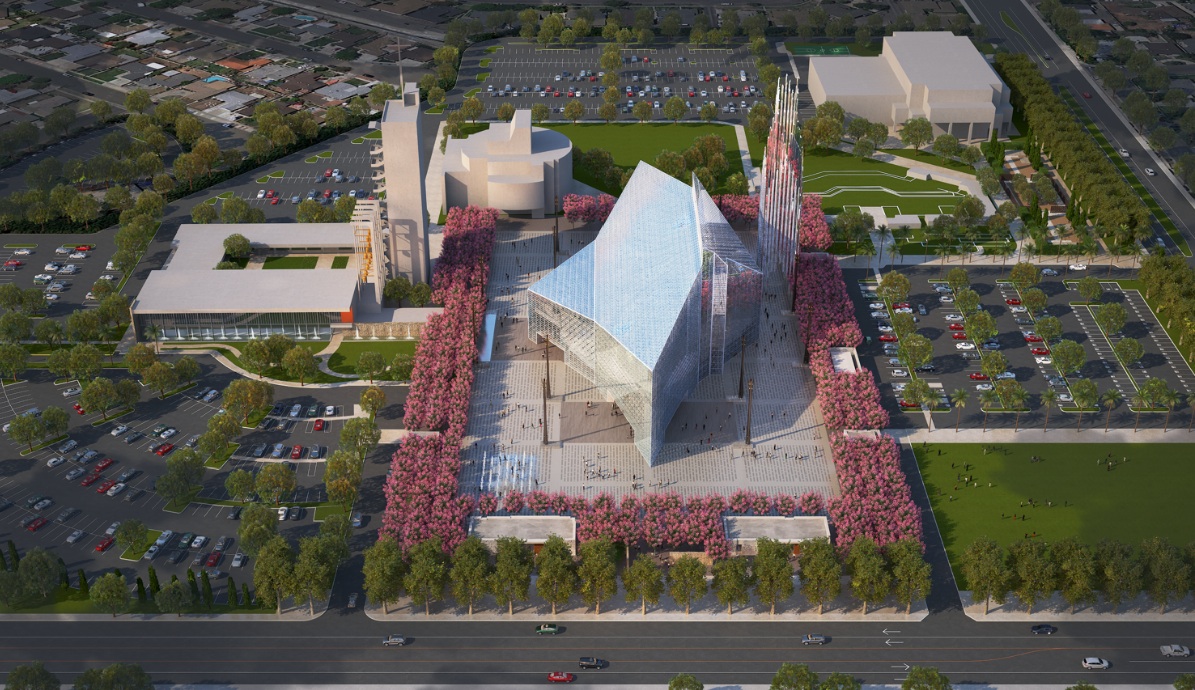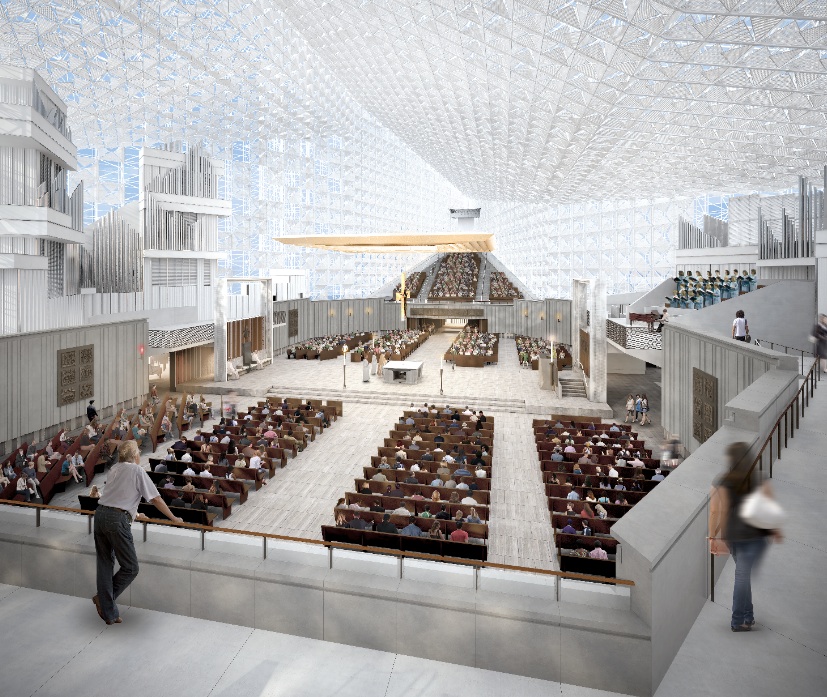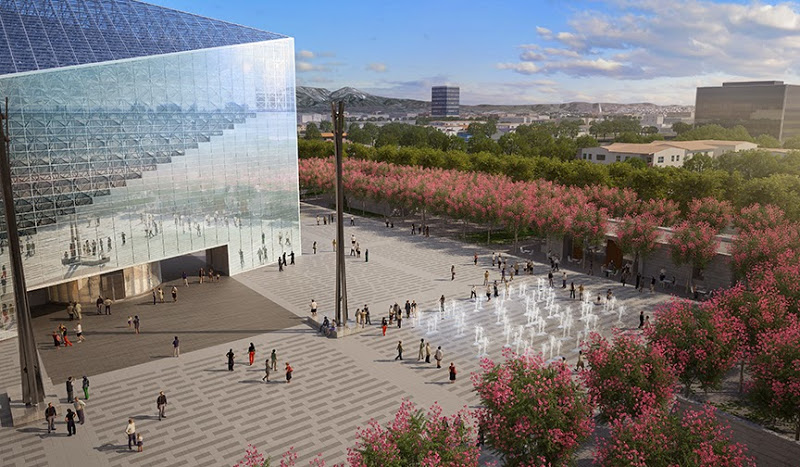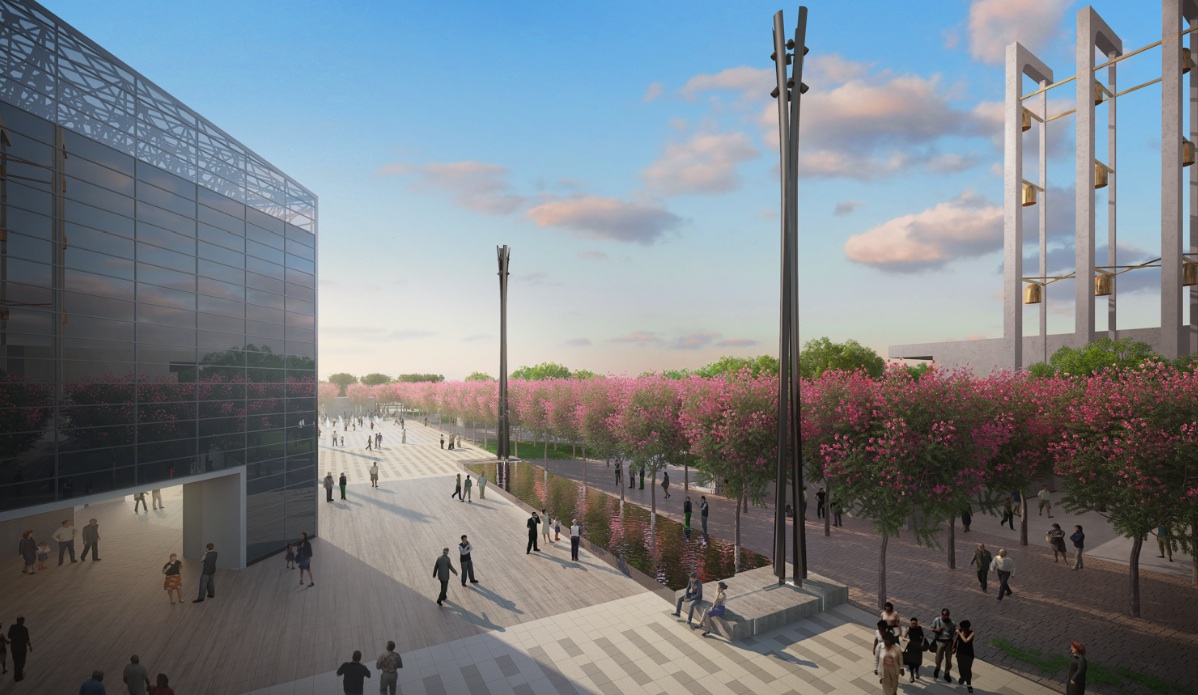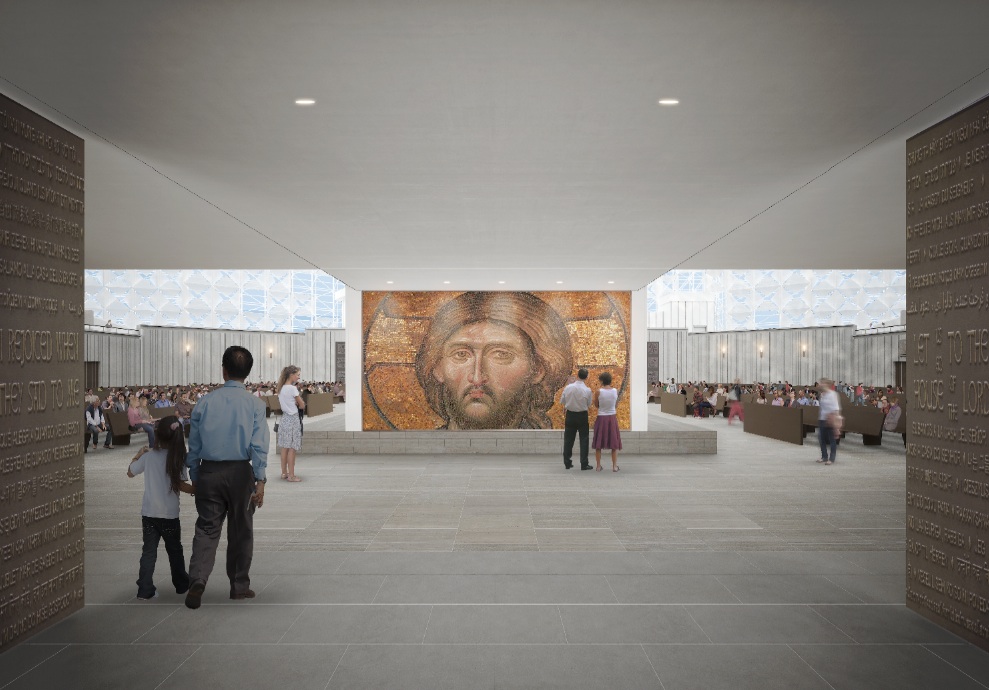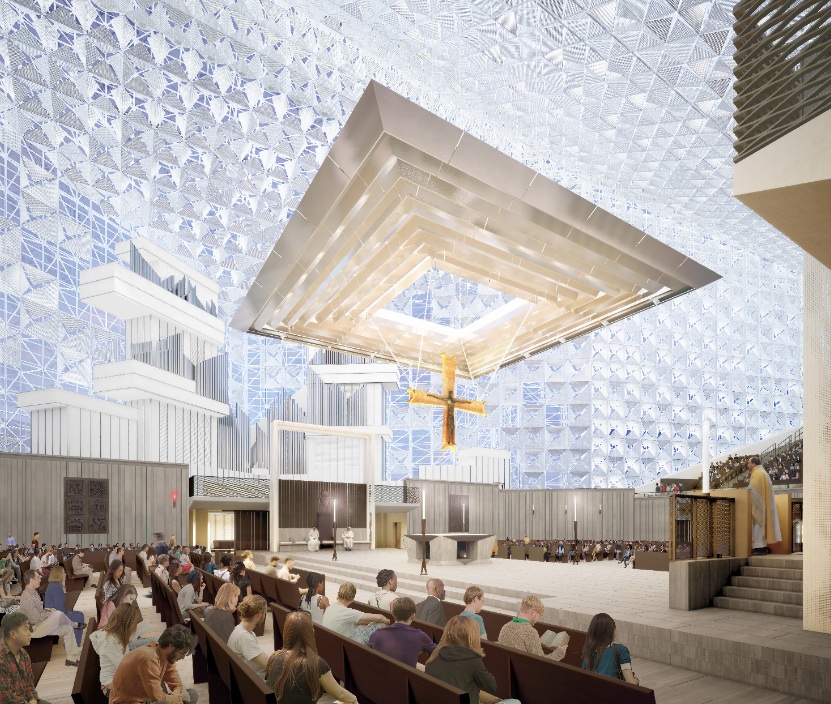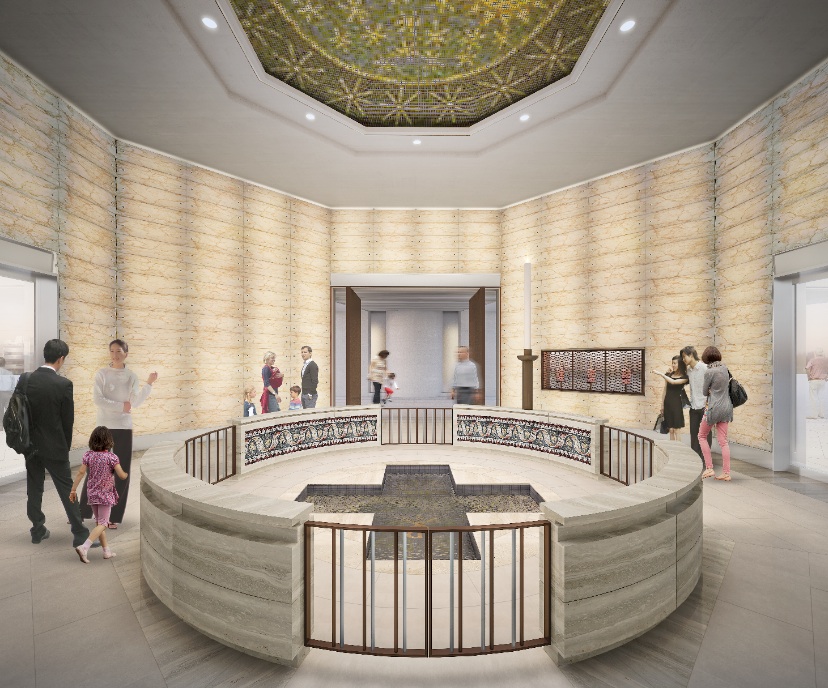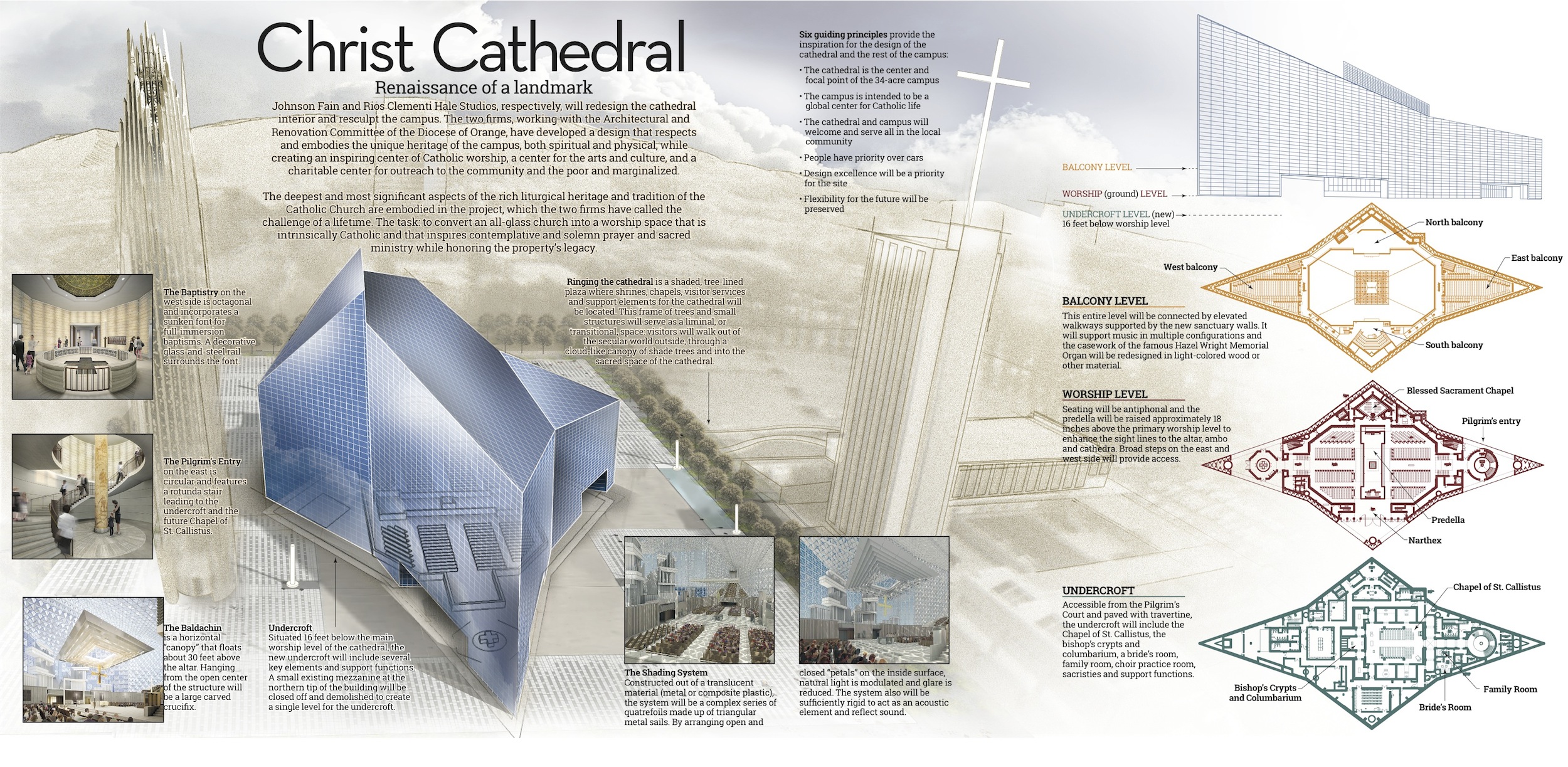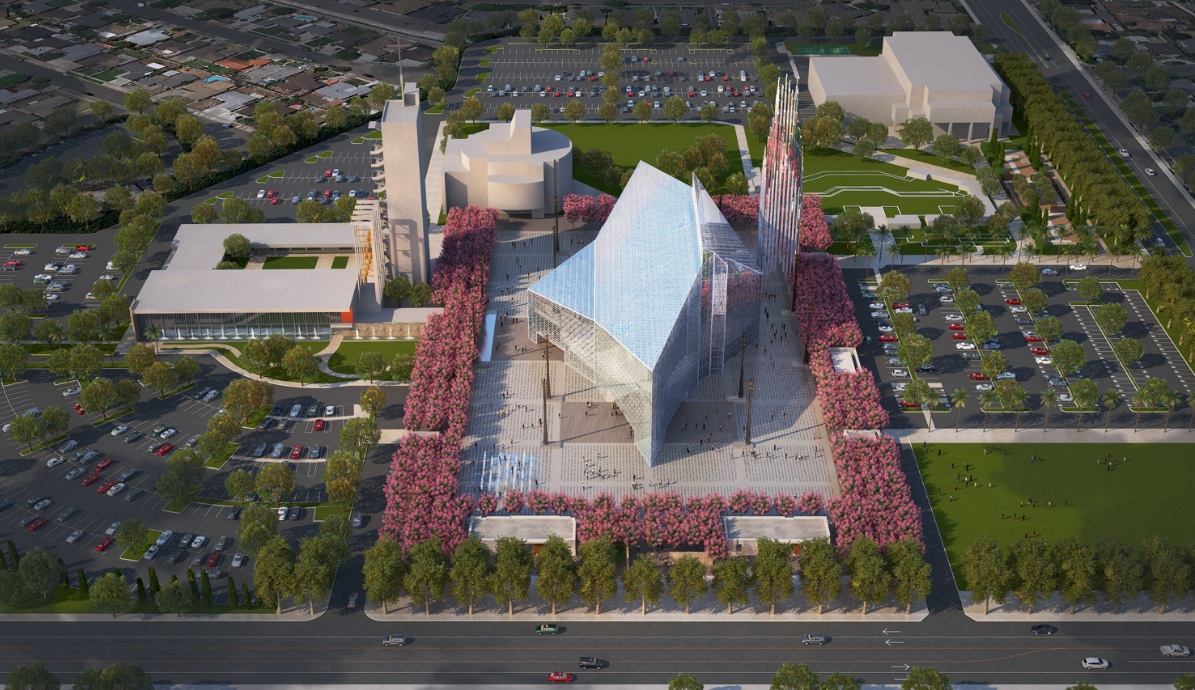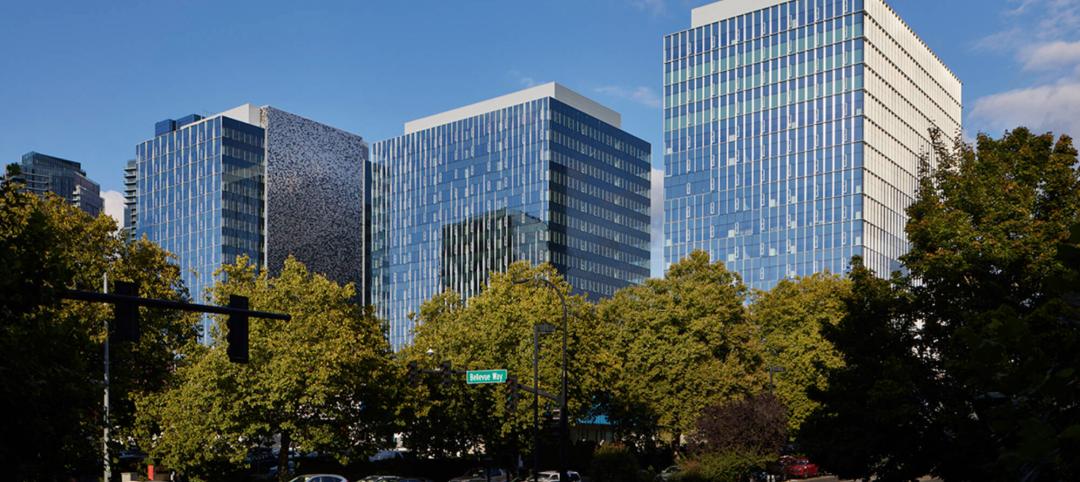The Roman Catholic Diocese of Orange has two retained architectural firms, Johnson Fain (with a focus on the Cathedral building itself) and Rios Clementi Hale Studios (with a focus on the exterior spaces), to create a design plan that addresses the complex needs of the 1.3-million-member diocese and the day-to-day needs of a more than 10,000-member Cathedral parish.
In addition to addressing these pressing needs, the design committee was tasked to develop a multifaceted plan that not only addressed the complex design requirements of transforming the Christ Cathedral into a space that is both liturgically and intrinsically Catholic, but also addresses a variety of intricate engineering challenges to bring the building and its grounds to the cutting-edge with regard to technology and site usability.
Within the interior of the cathedral the design ethic conserves and revitalizes the excellent and inspirational architecture that exists while transforming the space into one that supports the liturgical aspects of the Catholic faith and the centrality of the Eucharist.
The exterior design of the site works to create a structure and theme commensurate with the dynamism and beauty of the existing structures. This new landscape and the new spaces that will be created honor the history of the site, its architecture, and its worshippers while also enabling its renewed life as a Roman Catholic cathedral.
The design reinforces the liturgical importance of the cathedral building in relation to the adjacent buildings and welcomes pilgrims into an experience of faith as they enter the campus and cathedral.
PEDALS OF LIGHT
The design team confronted several dynamic challenges throughout this process unique to creating a Catholic cathedral that supports a solemn and prayerful experience from an existing structure. Given the glass façade of the cathedral, heat transfer, excess light, and acoustics presented a significant challenge. To address this, the design team developed an innovative treatment to be installed on the ceiling of the cathedral. The proposed treatment will be composed of a series of four rigid "petals" that cover each of the more than 10,000 panes of glass, opening between 15 and 45 degrees.
These petals will not only control light and heat transfer, but will assist with the acoustic properties of the space. The placement and aperture of the petals was a result of analyzing the sun's path of travel across the building's façade, an analysis of existing acoustic reverberation times and a careful study of how new lighting can be coordinated to cover the large and tall volume.
Additionally, the placement of the altar, the center point of the Catholic Mass, presented a challenge given the nearly one million cubic feet of space and the visually arresting Hazel Wright Organ, the fourth largest within a Church in the world. The liturgical experts and design team addressed this issue by drawing inspiration from the historical tradition of the Church. One of the oldest forms of a Catholic Church is an antiphonal layout, with the altar at the center of the space, with congregants on either side. This layout and altar placement allows for the maximum use of the space while ensuring the altar is truly the center point of focus within the cathedral.
This ambitious project has been divided into two phases of work: phase one will address itself to the worship level of the cathedral, major infrastructure elements, the cathedral courtyard and a reflection garden that will house the existing campus statuary and beautiful replicas of the more than 1800 "Walk of Faith" stones currently throughout the campus. Phase two will include an expansion of the Cathedral Memorial Gardens Cemetery, the undercroft, or lower level of the cathedral, and the remainder of the Master Plan for the campus grounds.
There is a $29 million allocation from the $100 million For Christ Forever capital campaign to support phase one of this project. Additional funding is being raised for this development plan through a long-planned "leadership gift" phase of the capital campaign.
HISTORY OF CHRIST CATHEDRAL
In the late 1970s, legendary American architect Philip Johnson and his partner John Burgee presented their designs for an "all-glass church" to Reverend Robert Schuller. Upon seeing the plans, Reverend Schuller exclaimed, "Wow, it looks like a crystal cathedral!" The building was a massive undertaking, taking over two years to complete. Standing 120 feet tall (12 stories), 141 feet long and 207 feet wide, this 78,397-square-foot edifice is constructed entirely of glass and steel.
With more than 10,000 panes of mirrored glass, the cathedral structure is known the world over for its inspiring beauty and breathtaking scale. The main sanctuary seats more than 2,000 people and will become a spiritual home to Orange County's more than 1.3 million Catholics. The cathedral has closed for an extensive renovation to remake the space as a place of Catholic worship and will reopen after its formal dedication in 2017.
Related Stories
AEC Tech Innovation | Oct 8, 2024
New ABC technology report examines how AI can enhance efficiency, innovation
The latest annual technology report from Associated Builders and Contractors delves into how artificial intelligence can enhance efficiency and innovation in the construction sector. The report includes a resource guide, a case study, insight papers, and an essay concerning applied uses for AI planning, development, and execution.
Healthcare Facilities | Oct 8, 2024
Herzog & de Meuron completes Switzerland’s largest children’s hospital
The new University Children’s Hospital Zurich features 114 rooftop patient rooms designed like wooden cottages with their own roofs. The project also includes a research and teaching facility.
Mixed-Use | Oct 7, 2024
New mixed-use tower by Studio Gang completes first phase of San Francisco waterfront redevelopment
Construction was recently completed on Verde, a new mixed-use tower along the San Francisco waterfront, marking the end of the first phase of the Mission Rock development. Verde is the fourth and final building of phase one of the 28-acre project that will be constructed in several phases guided by design principles developed by a design cohort led by Studio Gang.
Brick and Masonry | Oct 7, 2024
A journey through masonry reclad litigation
This blog post by Walter P Moore's Mallory Buckley, RRO, PE, BECxP + CxA+BE, and Bob Hancock, MBA, JD, of Munsch Hardt Kopf & Harr PC, explains the importance of documentation, correspondence between parties, and supporting the claims for a Plaintiff-party, while facilitating continuous use of the facility, on construction litigation projects.
Glass and Glazing | Oct 7, 2024
Pattern language: An exploration of digital printing on architectural glazing
Architectural Glazing has long been an important expressive tool which, when selected and detailed thoughtfully, can contribute to the successful transformation of architectural concepts to reality.
University Buildings | Oct 4, 2024
Renovations are raising higher education campuses to modern standards
AEC higher ed Giants report working on a variety of building types, from performing arts centers and libraries to business schools. Hybrid learning is seemingly here to stay. And where possible, these projects address wellness and mental health concerns.
AEC Tech | Oct 3, 2024
4 ways AI impacts building design beyond dramatic imagery
Kristen Forward, Design Technology Futures Leader, NBBJ, shows four ways the firm is using AI to generate value for its clients.
Laboratories | Oct 2, 2024
Trends in scientific research environments: Q&A with Flad's Matt McCord
As part of an ongoing series, Matt McCord, AIA, NCARB, LEED AP BD+C, Associate Principal with Flad Architects, discusses the future of the scientific workplace.
Museums | Oct 1, 2024
UT Dallas opens Morphosis-designed Crow Museum of Asian Art
In Richardson, Tex., the University of Texas at Dallas has opened a second location for the Crow Museum of Asian Art—the first of multiple buildings that will be part of a 12-acre cultural district. When completed, the arts and performance complex, called the Edith and Peter O’Donnell Jr. Athenaeum, will include two museums, a performance hall and music building, a grand plaza, and a dedicated parking structure on the Richardson campus.
Data Centers | Oct 1, 2024
10 biggest impacts to the data center market in 2024–2025
While AI sends the data center market into the stratosphere, the sector’s accelerated growth remains impacted by speed-to-market demands, supply chain issues, and design innovation necessities.


